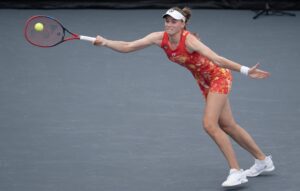After the exits of Simone Biles and Naomi Osaka from the Tokyo Olympics, as well as Emma Raducanu from Wimbledon, all implicating pressure as a reason, I have to wonder: What are we doing to our female athletes? Has the pressure around these women gone too far?
Hear me out for a sec.
I really wanted to listen to Simone Biles and understand where she’s coming from. Not only is she struggling with what gymnasts call “twisties,” a mid-air version of vertigo, but there was something even more revealing about her words. Biles said her Olympic experience in 2021 came to a point when she realized she was not competing for herself but competing for other people.
We can’t let that happen.
Women need to be able to compete for no one and nothing other than themselves. Period. Because for the most part–that’s what men get to do.
Somehow when a female athlete breaks through all the noise of smartphones and social media and gaming and entertainment to become a recognizable figure–largely through winning–we then feel compelled to heap additional burdens on her.
Biles, for all her success, was made the “face of” sexual abuse at the hands of a powerful figure, the “face of” NBC Sports as the US broadcaster of the Olympics, the “face of” gymnastics. Why can’t Simone Biles just be the face of Simone Biles?
It’s a similar story for Osaka, Raducanu, and Serena Williams.
Osaka chose to take on Black Lives Matter. That cause was important to her. But when she took a break from tennis to attend to her anxiety, the world anointed her the “face of” mental health. Other male athletes have opened up about mental health, such as Michael Phelps and Alex Rodriguez. But Phelps gets to just go on being Michael Phelps, and A-Rod is just A-Rod. No “face of.” Similarly, with a solid run in a tournament, Raducanu was hyped as Great Britain’s superstar hope to win Wimbledon. Suddenly she’s thrown on Centre Court and playing for country and expectations.
Since her return to tennis, Serena Williams has had to take on the burden of “doing it for the moms.” I’m not sure she ever asked for that. Williams is uniquely her. She’s earned the right to play free of any additional causes we want to heap upon her.
Ash Barty and her sponsor Fila chose to honor Yvonne Goolagong with a special dress at Wimbledon in homage to the former champion’s indigenous roots. Barty chose to take that on, and it was noble and special. But she should know that even if she had not, her victory at Wimbledon would mean just as much.
The hype machine and “storyline maker” dictates that it must go into overdrive to make its icon seen. Osaka couldn’t just win four Grand Slams and go about the business of playing tennis. She quickly became the highest paid female athlete on the planet, by virtue of companies like Nike, who have cynically glommed onto her anxiety as a way to promote her as the face of someone who will change the world’s view of mental health. That has to come with some weight.
Women are expected to have it all, be it all, play by the rules and break rules all at once. Be a “good girl” but be a glass ceiling shatterer. Be pretty but not too sexy. Enough already. We’re too hard on them. We’re expecting too much and putting too many off-the-court demands on them. How about we just let these women play? When you see a winning female athlete, before you tweet how “she will change the world,” why not just enjoy her efforts between the lines and analyze them without hyperbole, no matter the results.
Above all else, applaud female athletes’ in-game accomplishments- not just the off-the-field causes.
Main Photo from Getty.






